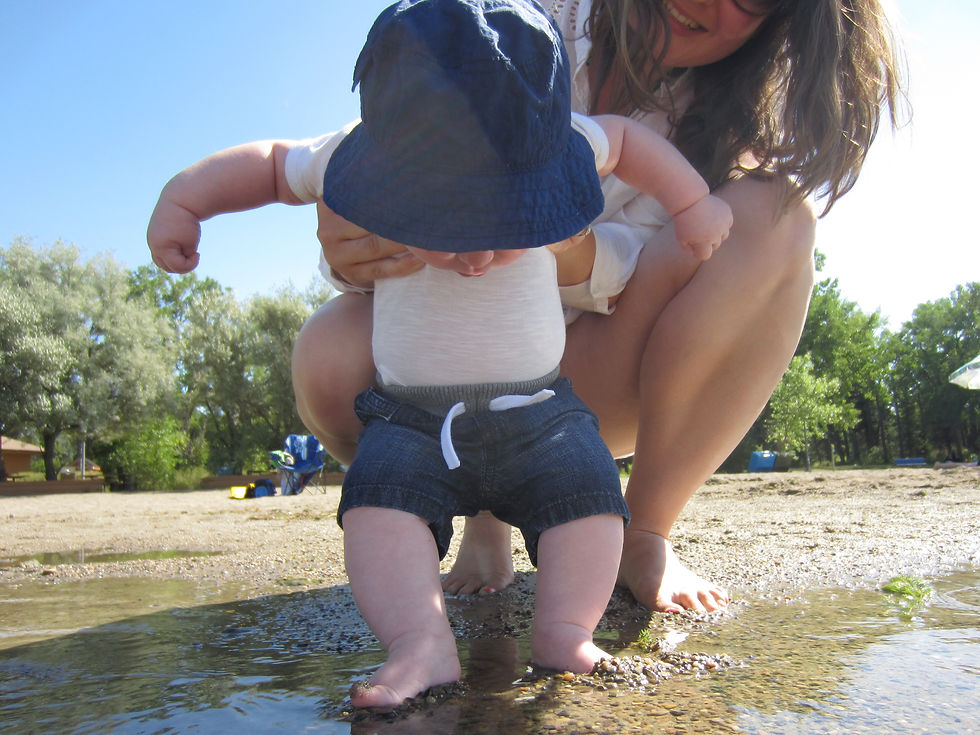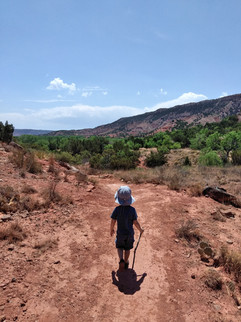Let's Start at the Very Beginning...
- Dara Hutchinson
- Feb 14, 2023
- 12 min read
Updated: Jun 27, 2024
A very good place to start (yes, The Sound of Music is one of my all time favourite movies!). Let's begin by going back to the birth of my firstborn, my son E. The year is 2015. I am 29 years old. I have a full time continuing position teaching grade one and my husband has just finished his PhD (he literally defended his thesis days before E was born!). E is the eagerly awaited first grandchild on both sides and loved by so many already. Everything is going according to my life plans. Career, husband, baby before 30 - check, check, check. After existing in life so far as a high achieving, people pleasing perfectionist (the way I controlled my underlying anxiety, I now realize), I am used to things going according to my plans. I am full of confidence that motherhood is a role I will be more than competent in (oh, the naivety!).

E joined the world and we were besotted. Throughout his infancy, he met all developmental milestones with no concerns. He was an adorable, curious, and pretty chill baby; as long as he was near me, he was content. I reveled in my role as his mama. As a newly minted family of three, we moved provinces when E was a few months old for my husband to complete his post doc, and the adventures in academia continued when a year later my husband took a tenure track position in the states, and off we went! These moves were big, no doubt, but they were a positive step forward for our family, and E did well throughout, continuing to thrive as an infant and toddler. He was healthy, bright, pleasant, adventurous, affectionate, artistic, athletic, imaginative, funny, perceptive, and so much more. After my 18 month paid maternity leave was up, I took an extended unpaid parenting leave from my teaching position and worked on finishing my master's while staying home full-time with E.

From a young age, he did struggle with sleep, was slower to warm up in social situations, and had separation anxiety, but these are common enough issues for young children that, although they presented challenges for our family, they were certainly not red flags for a developmental disorder.
His language skills were precocious and as his expressive capabilities developed along with his awareness of the world, it became clear that he was a very strong-willed, highly sensitive, deeply feeling child; his toddler “tantrums” were intense and he made his desires known from the very moment he could speak. He pushed back against every boundary and negotiated every limit. We started seeing aggression from the time he was about 18 months old, usually directed towards me when holding a boundary. The power struggles in our home were endless, yet so was the joy of seeing this sweet boy grow and learn.

As the years went on, E developed even stronger opinions and became very rigid in his thinking; when he was doing exactly what he wanted, he was delightful, but anytime he was asked or told to do something he didn’t want to do, he could have physically and verbally aggressive meltdowns that were frequent, lengthy, and severe. Almost anything could become a meltdown; he could be triggered by the bedtime routine of tooth brushing and bathing, being asked to get ready for the day, having a non-preferred food served at dinner, me needing to leave the house without him, being expected to attend lessons or activities outside the home if he was not in the mood, going to the dentist or doctor, and more. However, it was not the same triggers all the time; sometimes he did perfectly fine with one task, and the next time that same situation would be impossible for him. And in between the meltdowns, he appeared not to struggle at all and continued to be a happy, bright child who was eager to explore the world.
It was as if there were two versions of the same child, depending on his level of regulation. I was reading every parenting book, I am a naturally patient and gentle person, and I thought I understood young children well enough to make it through the toddler years unscathed, but none of the standard parenting techniques were working to help him be safe during his big emotions, and many suggestions actually made the situation worse. I was becoming very, very scathed. Still, dysregulation in the form of tantrums and aggression is common enough for 2, 3, and even 4-year-olds as they develop self-regulation skills and learn how to exist in the world, so we supported E as best we could with firm and loving boundaries at home and assumed he would grow out of it. He did not.
As he neared age 4.5 and we tried to start preschool, it became increasingly clear that the behaviors that had previously been in the realm of developmentally appropriate were not fading with age. Instead, the explosions were getting worse, he was getting bigger and stronger, and we were getting more burnt out. My husband and I were confused, resentful, exhausted; we had an extremely volatile child, and no idea why. I felt like a failure because I was a devoted and informed mother doing everything “right,” yet my child was struggling so much. I was struggling, too. I had worked with hundreds of young children, and my own son was the most challenging child I had ever encountered. His aggression was so unpredictable that being at home with him felt like walking on eggshells all the time; his behavior could flip from calm and happy to extremely aggressive in an instant for what seemed like no reason at all; indeed, he was so sensitive, he behaved like a child who had suffered trauma, though his life was privileged in so many ways. We simply did not know what to make of it. Not having any other answers, I was (wrongly) concluding that his struggles must be somehow the fault of my parenting, and the corresponding feelings of failure were slowly eating away at my wellbeing.
When we moved to the states, I never found any early childhood education options that lived up to my standards, so E had been home with me since he was born. At this point, public school was still the plan for kindergarten, so for PreK, we decided to enroll him in a half day preschool program. Well, attempting to start school in the fall of 2019 was disastrous. The experience was so intense that it became a catalyst for recognizing that something about this child was atypical.
As the summer came to a close, I pulled out all the stops in attempting to prepare him for the transition. I shared picture books about preschool, created social stories and illustrated charts about the new routines, and together we made daily and weekly visual calendars so he would know what to expect with the new rhythm of school. He picked a backpack and new school clothes, and I continued to engage in connection rituals to reinforce our attachment. I was confused when none of these strategies eased his distress; he shut down every attempt to even talk about school, he ripped up every book, poster, and chart I had made, and every preparation, as gentle as respectful as I thought they were, seemed to make him more agitated.
Still, we forged ahead, assumed it was going to be a difficult transition, but that we would get through it. Well, we did attend the preschool open house together and he enjoyed exploring the classroom, but on the first day of school, he would not get out of the car. Then the next day he would not get dressed. I was six months pregnant at the time and could not physically force clothes on him or strap him kicking and screaming into his car seat, and if he did agree to get in the car and we got to the school parking lot, he would unbuckle and hide under the seats. Pulling him out of the car unclothed, kicking and screaming felt wrong, so we were at a stalemate. I am a teacher who could not get my child to go to school.
For a week or so, he agreed to get into the car and just drive to the school to see how he felt once we got there, but he never made it inside the building. I was in constant contact with the school, and if we made it to the parking lot, they would send a staff member out to try and ease the transition. We also tried the accommodations of both an earlier and later start than the other children, to reduce some of the overwhelm of the start of school with so many people coming and going. Neither made a difference. Moreover, I was welcomed to stay with E for longer than most parents in the morning to help him feel more comfortable, which was enough reassurance to get him dressed and in the door of the classroom once, but when it was time for me to leave after half an hour or so, I had to peel him off me and leave him thrashing and screaming for me in the teacher’s arms. I walked out of the school crying with the sound of his screams reverberating down the halls. He was “fine” that day according to the school and didn’t have any behavioral issues once he calmed down after I left, and he was happy to see me when I picked him up, but he internalized the trauma of the separation, I’m sure. He never went back in the building again.
After experiencing his intense resistance and dysregulation every school day for weeks and weeks with no end in sight, we ended up unenrolling him in October and homeschooling for the remainder of his PreK year. I used a mixture of Reggio-inspired invitations to play and hands-on projects from my teaching days, as well as activities from Susie Allison’s wonderful Playing Preschool curriculum. I have PLENTY of examples of child-led early learning to share from his preschool years.
Thus ended our foray into traditional school and began our journey as homeschoolers (though we didn't know at the time it would be for more than a year!). We said to ourselves, maybe he just needs more time... E was just four years old, we had a new baby coming which he was having a hard time processing, he had never been in a traditional school setting before, and he was so bright and vivacious when regulated, so we gave him the benefit of the doubt and decided to wait and see what the next year brought.
Then, at the same time as he was struggling with school, he also began having issues participating in parent and tot classes he usually enjoyed like our music class and forest school playgroup. He would either refuse to go, refuse to get out of the car, refuse to participate, or demand to leave partway through. He also began having meltdowns in environments where he had never struggled, like at the dentist or doctor’s office, where he had previously been a model patient. His sleep also became highly disrupted and he would fight bedtime (often physically) for two or three hours until collapsing exhausted in my arms.
As we were noticing these signs of increased dysregulation in multiple environments, and meltdowns at home that were continuing to intensify, E became a big brother when our daughter B was born in December 2019. Adding another sentient being to our family was very hard for him; a new baby obviously required a lot of my time and presence, which meant less time for me to be with him. Like preschool, we had expected adding a baby to our family to be difficult for E, as it is for many older siblings, and had prepared him as much as possible in all the typical ways, but the transition was worse than we thought. There were moments when he was caring and lovely and drawing family portraits to melt the heart, then moments he was screaming that he wanted to “throw the f***ing baby in the garbage” and flipping over all the nursery furniture in rage. I couldn’t leave her unattended for a second in case his mood changed.
Then, when our daughter was 12 weeks old and E was struggling deeply, the world shut down due to Covid. It was a perfect storm of stressors, and our family was in crisis (though we couldn’t articulate it as such at the time, we were just trying to get through each day). For me personally, the combination of being newly post-partum in the middle of a pandemic while also parenting a very complex child was becoming too much for my own nervous system to handle. I was starting to struggle with depression and anxiety of my own, and years of responding to aggressive outbursts was turning into chronic trauma to my very taxed nervous system; but, again, I couldn’t articulate it that way yet, I was just in survival mode. Still, the world kept turning. The children kept growing. There were many, many difficult moments, and (as I am reminded as I go through photos to add to this post) many, many beautiful ones as well.
We reached out for support when E turned five in the spring of 2020. I had brought up his separation anxiety, aggression, tantrums, and sleep difficulties at well-checks with our family doctor before, had read the parenting books they suggested, and through our discussions had been previously reassured that everything we were seeing was developmentally appropriate. By now, however, it was clear that his challenges were going beyond what is typical, causing turmoil for our family, and spilling over to environments outside our home, so at his 5-year-old well check we were referred to a play therapist.
After a long waitlist, we began seeing a play therapist together in the fall of 2020. We saw her for a few months and were reassured that we were handling his outbursts as well as could be expected. I was already following the type of conscious/gentle/respectful/responsive parenting that the counselor advised. We were encouraged to keep at the firm and loving boundaries, and there was certainly no mention of any underlying diagnosis being a possibility. Our therapist introduced me to the work of the wonderful Mona Delahooke and I felt supported and listened to in our parent sessions. Moreover, attending the play sessions with E (he was never able to stay alone) underlined the importance of child-led play to our connection (coregulating through focused one-on-one play continues to be one of the major ways I support his nervous system). Play therapy was not a complete loss, but we were still seeing meltdowns and aggression so it didn’t “fix” anything.
That same fall, 2020 when E was registered to start kindergarten at our neighbourhood school, we pulled him out at the last minute over concerns about Covid for in-person classes, as well as our intuition that the option of virtual learning was not going to be a good fit for him. Without a better option, we kept homeschooling through kinder, though any type of formal activity was becoming difficult for me to introduce without meeting a lot of resistance, so we were naturally leaning further and further towards unschooling.
The rollercoaster of daily ups and downs continued through 2021 until our family hit a breaking point when a contractor error during a renovation of our popcorn ceilings meant our air quality was severely compromised. We had to leave our house immediately and live at an Airbnb for six weeks because every single item in our house had been exposed to dangerous levels of asbestos. Hard surfaces had to be professionally cleaned by an abatement company and every soft and porous item (linens, mattresses, clothes, carpeting, upholstered furniture, etc.) had to be thrown away. We lost almost everything we owned, had to spend all our savings on the cleanup and replacement of items, and our house was left in shambles. The renovations were put on hold, and we are still dealing with the fallout as we slowly work on doing what we can ourselves. We are still battling with lawyers and insurance companies in the hopes of being compensated for the astronomical cost of cleaning and replacing everything we own and paying for alternate living accommodations during the time we were out of our house. Understandably, this was a stressful period for the grownups in our family, and it was also hard for E to be living somewhere new and dealing with the trickle-down effects of all the uncertainty. Daily tasks like hygiene, toileting, and meals were becoming almost impossible to undertake without an aggressive meltdown.
E turned six while we were out of our house and during his six-year-old well check, I explained that the aggression was not fading, play therapy had not made any real difference to the challenging behaviours, and our family was continuing to struggle because of his explosive outbursts. We were referred to a child psychiatrist. It was around this time I also started seeing a therapist for myself.
After another long waiting list for the child psychiatrist, we had our initial appointment in June 2021. After hearing our story, she said that although E's behaviour could warrant medication to regulate his mood, she would rather try behavioral strategies first (I agreed with this, at the time). However, her “behavioral strategies” basically meant she thought we should change our parenting to be more firm about our expectations, have more serious consequences for his aggression, and use screens as a reward for “age-appropriate behavior.” For a mother like me who already harbored so much guilt and worried that E's behavior was indeed somehow my fault, this professional advice was a heartbreaking blow to my mental health. Even though we had tried every parenting strategy over the years, we decided to follow her advice and double down on consequences because we were at the end of our rope and she was a trusted professional, after all. The ten day period when we followed her recommendations about firmer limits was the worst week of our lives; the level of dysregulation in our home was traumatizing and unsustainable. E was upsettingly violent and destructive towards us and our home. After that awful experience, we happened to be leaving on summer vacation, so we left all her suggestions behind and enjoyed our holiday. We didn’t know what to do next, but her recommendations were not the way forward for our family, that much was clear.

It was around this time that I was starting to become more aware of the possibility that E might be neurodivergent. His aggression wasn't simply defiance, it was likely a symptom of something deeper, though we still had no idea what that something might be. It wouldn't be long, however, until a casual online comment would end up changing the trajectory of our lives.
So, 3000 words later, there's the brief overview of my first six years as a mother; it was a relentless rollercoaster of juxtaposition, chaos and joy side by side every single day. Easy? No. Worth it? Yes.













































































It’s such an amazing true story , so proud of you Dee , it’s great that you can share the journey with E so far and help others as is your nature , Love Dad .